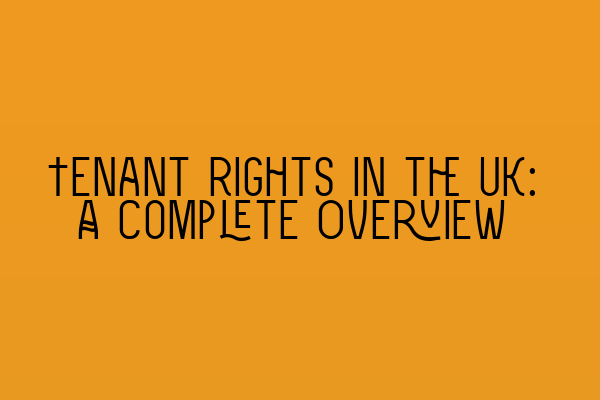Tenant Rights in the UK: A Complete Overview
As a tenant in the UK, it is crucial to be aware of your rights and obligations to ensure a smooth and mutually beneficial tenancy agreement. This comprehensive overview will guide you through the important aspects of tenant rights and provide you with the knowledge you need to protect yourself and your interests.
1. Right to a Written Agreement: Every tenancy in the UK should have a written agreement, also known as a tenancy agreement. This document outlines the terms and conditions of the tenancy, including the rent amount, payment schedule, duration of the tenancy, and other important details. It is crucial to carefully review and understand the agreement before signing.
2. Security of Tenure: In most cases, tenants in the UK have the right to remain in the property for a specified period, as stated in the tenancy agreement. This is known as security of tenure and provides tenants with stability and the ability to plan their lives accordingly. However, there are exceptions, such as when the landlord needs to regain possession of the property for certain reasons.
3. Rent Increases: Landlords have the right to increase the rent during the tenancy, but there are rules and regulations in place to protect tenants. In most cases, landlords must provide at least one month’s notice before increasing the rent. Additionally, some tenancies may have rent control regulations that limit the amount and frequency of rent increases.
4. Repairs and Maintenance: Landlords are responsible for maintaining the property and ensuring it is in a habitable condition. This includes addressing any necessary repairs, providing necessary services (such as heating and hot water), and ensuring the property is safe and free from hazards. If repairs are needed, tenants should promptly inform the landlord or letting agent in writing.
5. Protection of Deposits: In the UK, landlords are required to protect tenants’ deposits in a government-approved tenancy deposit scheme. This ensures that tenants can reclaim their deposit at the end of the tenancy, provided they have met all the terms of the agreement and left the property in good condition. If a landlord fails to protect the deposit, tenants may be entitled to compensation.
6. Privacy and Notice Periods: Tenants have the right to enjoy their home in privacy. Landlords should not enter the property without proper notice, except in cases of emergencies. Typically, landlords must provide at least 24 hours’ notice before entering the property for inspections or repairs. It is important to carefully review the tenancy agreement for specific notice period requirements.
7. Discrimination and Harassment: The Equality Act 2010 protects tenants from discrimination based on certain protected characteristics. Landlords must not discriminate against tenants based on their age, sex, disability, religion, or race. If a tenant believes they have been discriminated against, they should seek legal advice and may have grounds for legal action.
8. Early Termination: Tenants may have the option to terminate the tenancy early under specific circumstances, such as domestic violence or serious disrepair. However, there may be financial implications, and it is important to seek legal advice before taking any action.
In conclusion, understanding your rights as a tenant in the UK is essential for a positive and secure renting experience. By familiarizing yourself with the laws and regulations governing tenancies, you can protect your interests, ensure fair treatment, and maintain a good relationship with your landlord.
For more information on the SQE exam and preparation resources, check out these related articles:
– SQE 1 Practice Exam Questions
– SQE 1 Practice Mocks FLK1 FLK2
– SQE 2 Preparation Courses
– SQE 1 Preparation Courses
– SRA SQE Exam Dates
Remember, knowing your rights is the first step to a successful and fulfilling tenancy!
